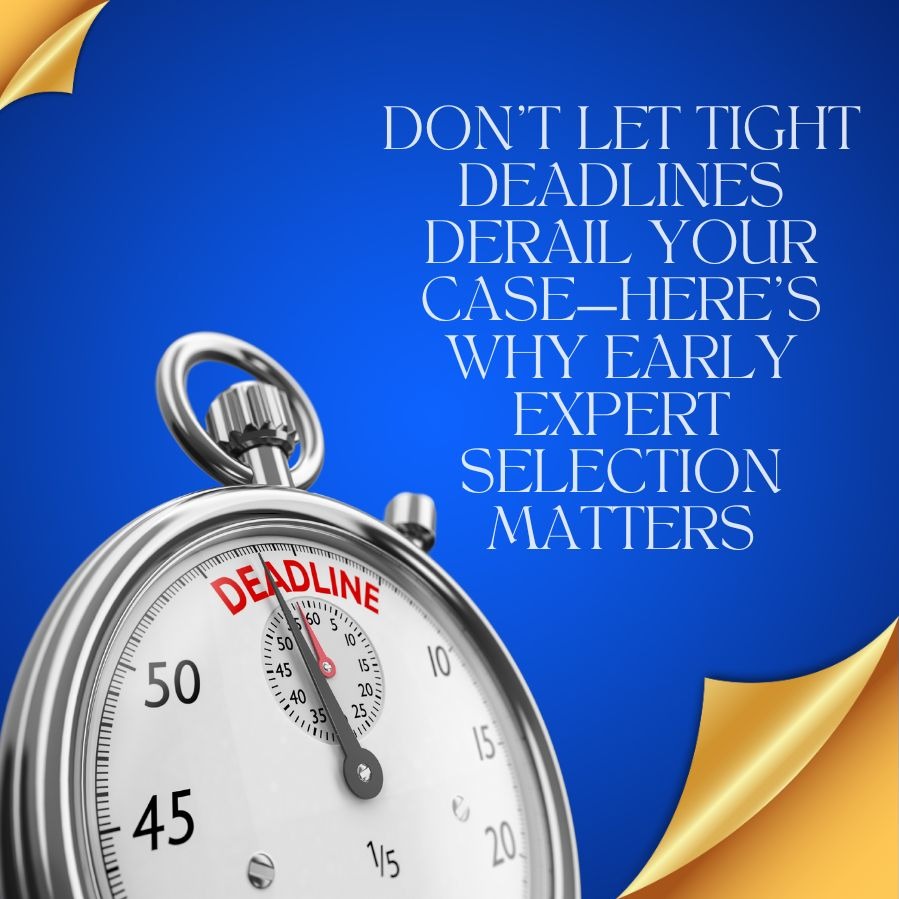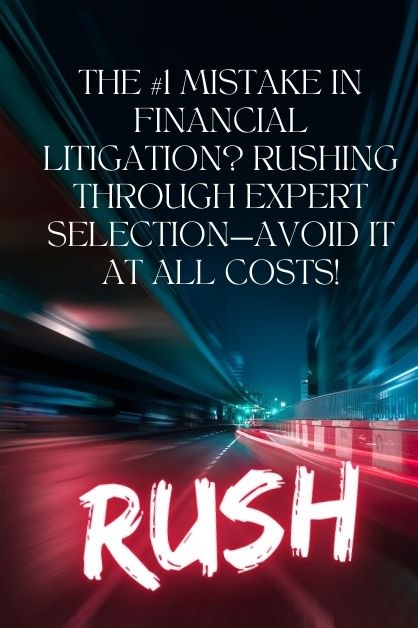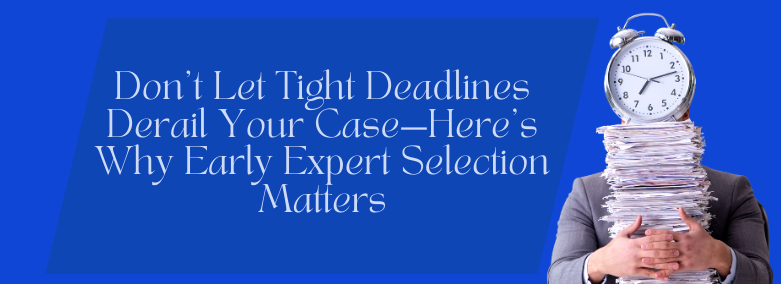Avoid Financial Litigation Setbacks: How to Choose the Right Valuation Expert
In 1999, the case of Allison v. McGhan Medical Corp. provided a stark example of the potential pitfalls that arise when a law firm selects the wrong valuation expert witness in complex financial litigation . This case, involving allegations of defective breast implants, required expert testimony on the valuation of the plaintiff’s economic losses. The plaintiffs’ legal team hired an expert with an impressive academic background but insufficient experience in the valuation of personal injury claims. The expert’s inappropriate methodologies and inability to relate the data to industry-specific factors resulted in the exclusion of their testimony, ultimately leading to the case’s collapse.
This example highlights a key lesson: selecting the right valuation expert is critical to the success of any financial litigation. While experts bring essential knowledge to help courts, juries, and attorneys navigate complex financial matters, such as asset valuations or damages assessments, poorly vetted experts can undermine a case’s credibility.

This article outlines how to thoroughly vet and select the right valuation expert witness for financial litigation, ensuring their testimony is both credible and admissible in court.
Selecting the right valuation expert witness is crucial to avoiding costly mistakes in complex financial litigation. This article explains how to overcome vetting difficulties, address bias and conflicts of interest, and manage cost considerations when selecting expert witnesses for legal cases. Learn how ExpertConnect Litigation Support can streamline the process and improve your case outcomes.
Case Study: Allison v. McGhan Medical Corp. (1999)
In Allison v. McGhan Medical Corp., the plaintiffs sued McGhan Medical for defective breast implants, alleging severe physical and economic damages. Their legal team hired a valuation expert to calculate the long-term economic impact of these injuries. Despite the expert’s impressive academic credentials, they lacked the necessary experience with personal injury claims and had never testified in a similar case.
Several key problems arose with the expert’s analysis:
Inappropriate Valuation Method: The expert applied a standard business valuation method to assess personal injury damages, which led to a calculation that was irrelevant to the specific circumstances.

Failure to Address Industry-Specific Factors: The expert did not consider factors unique to medical devices and personal injury litigation, resulting in skewed projections.
Overly Optimistic Financial Assumptions: The valuation relied on data that did not reflect the realities of the plaintiffs’ condition and long-term medical costs.
Ultimately, the court excluded the expert’s testimony under the Daubert standard, deeming it unreliable and speculative. Without a credible valuation expert, the plaintiffs’ case was severely weakened, and they lost the opportunity to recover significant damages.
This case underscores how crucial it is to select an expert with both the appropriate methodologies and relevant industry experience. Law firms must avoid the common mistakes made in Allison v.
McGhan by ensuring their experts are well-vetted and capable of defending their analyses in court.
Common Mistakes Law Firms Make in Selecting Valuation Experts
Several mistakes commonly occur when law firms select valuation experts for complex financial litigation, as highlighted in Allison v. McGhan Medical Corp.:
Overemphasis on Academic Credentials: While education is important, prioritizing academic qualifications over practical experience can lead to hiring experts who are not equipped to handle the specific challenges of the case.
Insufficient Industry Experience: Selecting an expert without experience in the relevant industry or context—whether it’s healthcare, personal injury, or intellectual property—can result in misapplied methodologies.
Lack of Litigation Experience: Experts without courtroom experience may struggle to defend their analyses under cross-examination.
Methodological Errors: Failing to ensure that the expert uses appropriate, case-specific valuation methods can lead to unreliable or inadmissible testimony.
Ignoring Bias or Conflicts of Interest: Overlooking subtle biases or potential conflicts of interest can damage an expert’s credibility in court.

Inadequate Communication Skills: An expert who cannot clearly explain complex valuation concepts to a judge or jury may weaken the case, even if their analysis is sound.
Steps to Vetting Valuation Expert Witnesses
To avoid the costly mistakes seen in Allison v. McGhan, law firms should follow a structured process for vetting valuation expert witnesses. Here are the key steps:
1. Identify the Specific Expertise Needed
Each financial litigation case requires a valuation expert with specialized knowledge. For example:
A business valuation dispute requires an expert experienced in valuing companies and assets.
Intellectual property cases demand an expert familiar with patent or trademark valuation, licensing agreements, and industry-specific trends.
Personal injury claims need experts who can accurately assess economic losses and medical costs.
Identifying the specific expertise required ensures the expert will be well-versed in the nuances of the case.
2. Research Potential Valuation Experts
Once the type of expert is determined, law firms must conduct comprehensive research to find the right candidates. Several resources can aid in this search:
Professional networks: Referrals from trusted colleagues or industry contacts can lead to experienced experts with proven litigation success.
Litigation support services: These services provide pre-screened expert witnesses with verified qualifications and courtroom experience, making it easier to find credible experts. ExpertConnect Litigation Support is one of the most trusted services currently available.
Publications and industry contributions: Experts who regularly publish in their field or speak at conferences are often leaders in their area of expertise, enhancing their credibility in court.
3. Evaluate Credentials and Legal Experience
When evaluating an expert’s credentials, law firms should consider both academic and practical experience. Important factors include:
Certifications: Designations like Certified Valuation Analyst (CVA), Chartered Financial Analyst (CFA), or Accredited Senior Appraiser (ASA) signal expertise.
Litigation experience: Prior courtroom testimony ensures the expert is comfortable defending their analysis in high-stakes environments.
Publications: Experts who contribute to journals or speak on valuation topics may be more persuasive in court due to their established authority in the field.
4. Screen for Bias and Conflicts of Interest
In complex litigation, it is essential to ensure the expert has no ties to any party involved in the case. Bias can undermine the expert’s credibility, so law firms must:
Conduct comprehensive background checks: Ensure the expert has no professional or financial relationships that could create conflicts.
Assess prior work history: An expert who predominantly works for plaintiffs or defendants may appear biased, even if unintentionally.
5. Review Prior Testimony and Courtroom Experience
The expert’s ability to handle cross-examination and communicate clearly in court is essential. Law firms should:
Review transcripts of past testimony: This helps gauge the expert’s ability to explain complex data persuasively.
Assess the expert’s methodological soundness: Experts should be proficient in multiple valuation techniques and apply the appropriate methodology to each case.
6. Assess Communication Skills
An expert witness must be able to simplify complex financial concepts for a lay audience, including juries and judges. During interviews, ask the expert to explain their valuation methodology to determine if they can communicate effectively.
7. Test the Expert’s Opinions and Methodologies
Before fully committing to an expert, law firms should provide case materials for an initial assessment. Testing their opinions helps:
Identify any potential weaknesses in their approach.
Ensure the expert’s conclusions are based on sound data and are defensible in court.
8. Consider Cost and Availability
Top experts often charge high fees, but their contributions can make or break a case. Law firms should:
Balance cost considerations: Weigh the cost of hiring the expert against the potential financial impact of losing the case without their testimony.
Confirm the expert’s availability: Ensure they can commit to depositions, trial preparation, and court appearances according to the case timeline.
Summary: Strengthening Cases with Proper Expert Vetting
The Allison v. McGhan Medical Corp. case underscores the importance of selecting the right valuation expert for complex financial litigation . By following a thorough vetting process—evaluating credentials, assessing neutrality, reviewing prior testimony, and testing methodologies—law firms can ensure their experts provide credible, reliable, and admissible testimony.
For law firms seeking to streamline this process, ExpertConnect Litigation Support offers pre-screened, courtroom-ready valuation experts who can significantly strengthen your case. By following these steps and using expert resources, you can avoid costly mistakes and improve your chances of success in court.
Citing: Allison v. McGhan Medical Corp. (1999): Source: United States Court of Appeals, Eleventh Circuit Citation: 184 F.3d 1300 (11th Cir. 1999)